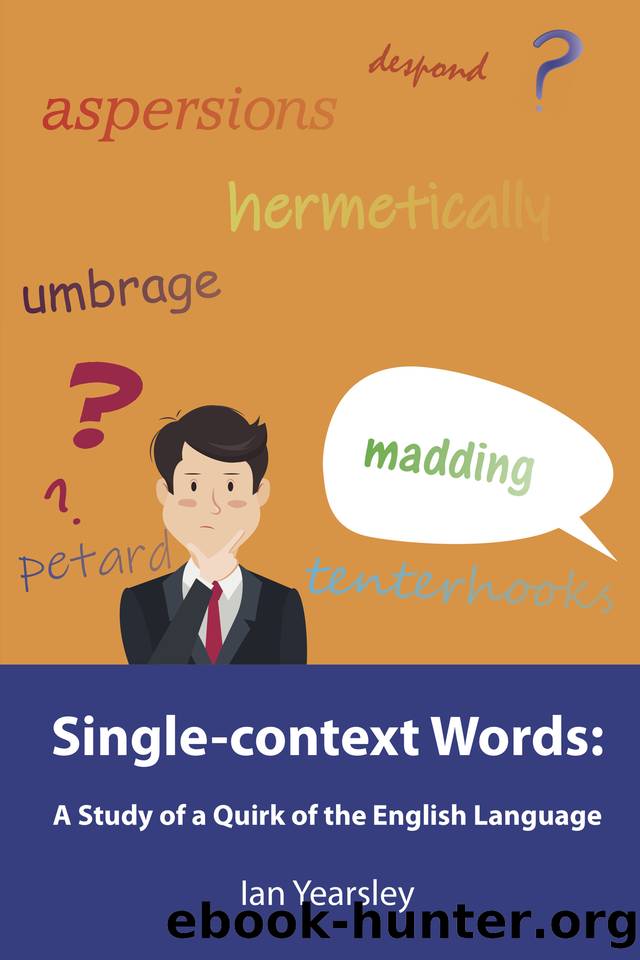Single-context Words: A Study of a Quirk of the English Language by Ian Yearsley

Author:Ian Yearsley [Yearsley, Ian]
Language: eng
Format: azw3, epub
Publisher: Paragon Publishing
Published: 2020-09-30T00:00:00+00:00
Pronouns
There do not appear to be any pronouns which are single-context words.
Adjectives
An adjective is a descriptive word applied to a noun, e.g. a black cat or a wooden table.
addled [⦠brain]
The adjective âaddledâ is almost always used in the phrase âaddled brainâ to mean âmuddledâ or âhaving lost the ability to think clearlyâ. It can, however, also be used to describe a rotten egg. The short-lived and non-functioning Parliament of 1614 was called âthe Addled Parliamentâ. The verb âto addleâ has several variations and meanings.
aforethought [malice â¦]
The word âaforethoughtâ, meaning âentertained in the mind beforehandâ or âpremeditatedâ, is most used in the legal phrase âmalice aforethoughtâ to refer to a premeditated crime.
akimbo [arms/legs â¦]
Originally meaning âwith hands on hips and elbows turned outwardsâ, the word âakimboâ has also been adopted for use with legs. It is therefore usually found in two phrases â âarms akimboâ (which is tautological) and âlegs akimboâ.
bare-faced [⦠cheek]
The word âbare-facedâ (which is also available unhyphenated) originates from a physical description of a man without a beard. Its usage has expanded from that origin to mean âwithout a maskâ or âundisguisedâ, in both the literal and figurative senses. Although it can still be applied in such contexts, it is almost exclusively used now in the tautological phrase âbare-faced cheekâ to mean âso undisguised that the person concerned does not care if they are behaving wronglyâ.
bare-knuckle [⦠fight]
The word âbare-knuckleâ is used solely in the context of a bare-knuckle fight â a fight without (boxing) gloves. It can be used figuratively as well as literally.
bated [with ⦠breath]
Although it has other archaic meanings as a verb, the word âbatedâ in its adjectival form is used exclusively in the phrase âwith bated breathâ to mean âwith breathing subdued or restrained under awe, terror or some other emotionâ. It has associations with the word âbeatâ in the latterâs meaning of âbeat downâ or âput an end toâ.
beady [⦠eye(s)]
The word âbeadyâ means âlike a beadâ. It is used exclusively in the context of âbeady eye(s)â (singular or plural). It can be used literally, but it is more likely to crop up in speech in a figurative sense to imply that a person is keeping a close watch on something or someone. It is frequently used as a warning, as in, for example, âIâve got my beady eye on youâ, to mean âIâm watching you, so youâd better not misbehaveâ.
beholden [⦠to]
The word âbeholdenâ, meaning âunder personal or moral obligationâ, is usually followed by âtoâ, for example in the phrase âshe knew she would be beholden to him foreverâ.
bereft [⦠of]
âBereftâ is an adjective meaning âforcibly deprivedâ. It derives from the word âbereaveâ, as in âbereavementâ, and is almost always followed by âofâ, as for example in the sentence âhe was bereft of confidence as he had been lied to beforeâ.
blithering [⦠idiot]
Deriving from the verb âto blitherâ, which means âto talk nonsenseâ, the word âblitheringâ is used only in the phrase âblithering idiotâ to describe a person who talks nonsense.
Download
Single-context Words: A Study of a Quirk of the English Language by Ian Yearsley.epub
This site does not store any files on its server. We only index and link to content provided by other sites. Please contact the content providers to delete copyright contents if any and email us, we'll remove relevant links or contents immediately.
Cecilia; Or, Memoirs of an Heiress — Volume 1 by Fanny Burney(32548)
Cecilia; Or, Memoirs of an Heiress — Volume 2 by Fanny Burney(31947)
Cecilia; Or, Memoirs of an Heiress — Volume 3 by Fanny Burney(31932)
The Lost Art of Listening by Michael P. Nichols(7494)
Asking the Right Questions: A Guide to Critical Thinking by M. Neil Browne & Stuart M. Keeley(5762)
We Need to Talk by Celeste Headlee(5608)
On Writing A Memoir of the Craft by Stephen King(4936)
Dialogue by Robert McKee(4389)
Pre-Suasion: A Revolutionary Way to Influence and Persuade by Robert Cialdini(4224)
I Have Something to Say: Mastering the Art of Public Speaking in an Age of Disconnection by John Bowe(3878)
Elements of Style 2017 by Richard De A'Morelli(3343)
The Book of Human Emotions by Tiffany Watt Smith(3303)
Fluent Forever: How to Learn Any Language Fast and Never Forget It by Gabriel Wyner(3079)
Name Book, The: Over 10,000 Names--Their Meanings, Origins, and Spiritual Significance by Astoria Dorothy(2980)
Good Humor, Bad Taste: A Sociology of the Joke by Kuipers Giselinde(2945)
Why I Write by George Orwell(2945)
The Art Of Deception by Kevin Mitnick(2796)
The Grammaring Guide to English Grammar with Exercises by Péter Simon(2740)
Ancient Worlds by Michael Scott(2682)
